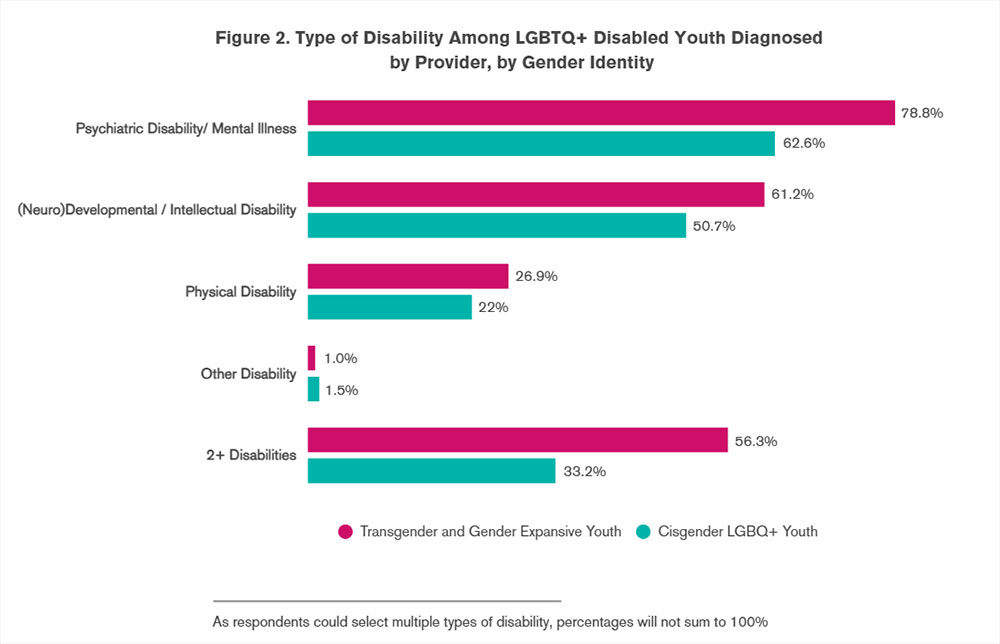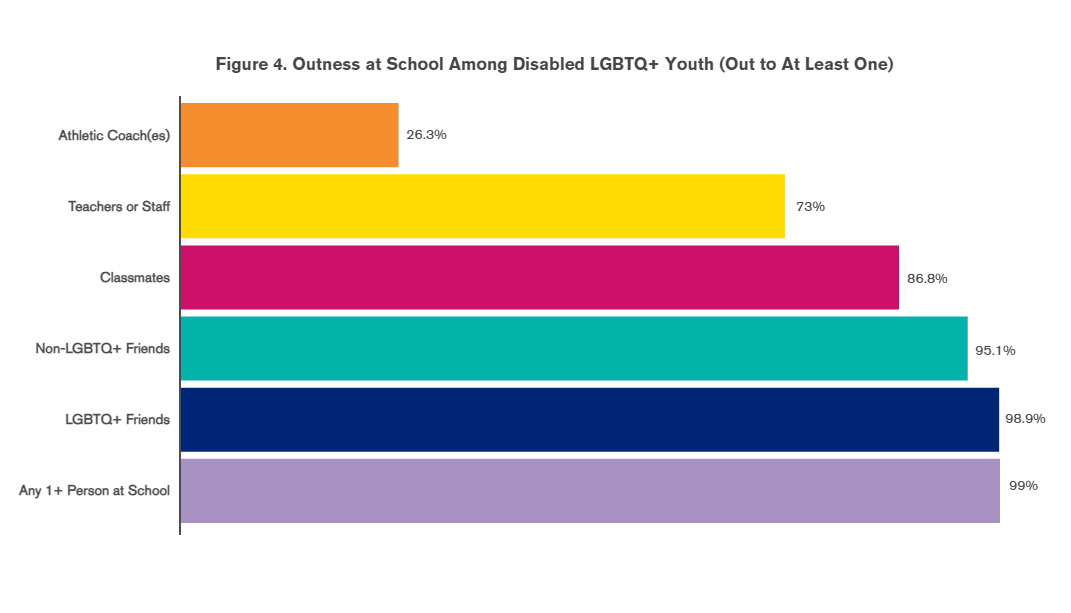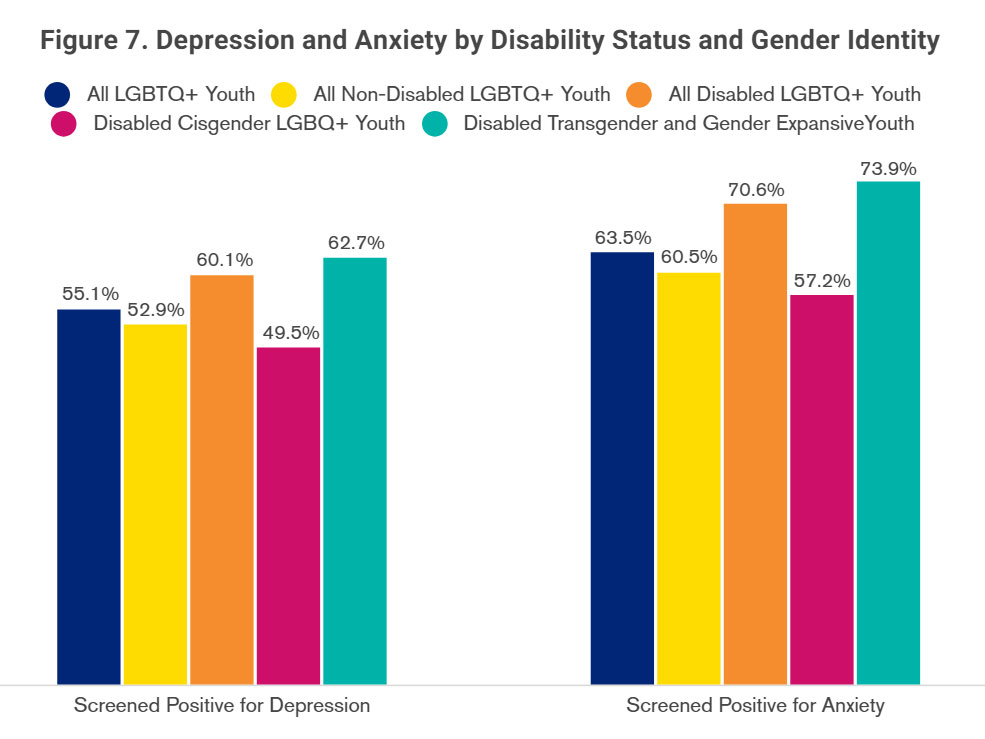Three in 10 LGBTQ+ youth have at least one formally diagnosed disability, making them particularly vulnerable to in-school victimization and exclusion, according to a new report.
The 2024 Disabled LGBTQ+ Youth Report, conducted by the Human Rights Campaign and researchers at the University of Connecticut, also found LGBTQ+ teens are twice as likely as the overall student population to have a medically documented disability.
About 75% of disabled LGBTQ+ students surveyed have a mental health diagnosis such as depression or anxiety, nearly 60% have a neurodevelopmental/intellectual disability such as autism, and about 25% have a physical disability. More than 50% have more than one diagnosed disability.
The survey also found more than 80% of disabled LGBTQ+ students are transgender or gender-expansive.

Source: 2024 Disabled LGBTQ+ Youth Report
Disabled LGBTQ+ Students and School Safety
When it comes to school safety, 62.5% of disabled LGBTQ+ students reported physical or verbal harassment in the month before the survey was distributed. More specifically, 54.2% were made fun of by other students, 44.2% were called names, and 20.6% were hit or pushed. Further, in the past year, 59.6% of disabled LGBTQ+ youth were bullied for their LGBTQ+ identity and 37.9% were bullied for their disability.
RELATED: School Hate Crimes Tripled in States with Anti-LGBTQ+ Laws
Only one-third of respondents said they have reported harassment or bullying to school staff, and 49.7% who did report it said the employee helped only a little or not at all.
More than half (55.1%) also reported feeling unsafe in at least one school setting, and disabled transgender and gender-expansive youth are twice as likely as disabled cisgender LGBQ+ youth to feel unsafe in school. About half (50.2%) of disabled LGBTQ+ youth and more than half (57.5%) of disabled transgender or gender-expansive youth reported feeling unsafe in locker rooms, compared to 39.6% of all LGBTQ+ youth. Additionally, 33.6% of disabled LGBTQ+ youth, including 38.9% of disabled transgender and gender-expansive youth, reported feeling unsafe in bathrooms, compared to 26.2% of all LGBTQ+ youth.
“Gender-inclusive restrooms, locker rooms, and other spaces are a rarity,” the researchers wrote. “As a result, disabled trans and gender-expansive youth face heightened access barriers to bathrooms and facilities that both match their gender identity and which accommodate their disability.”
According to The 74, research by the U.S. Government Accountability Office found two-thirds of school buildings are not physically accessible to many people with disabilities. School bathrooms were one of the most common places the agency found that children with impaired mobility and other physical disabilities could not use.
RELATED: Going Up? Prioritizing Elevator Safety in Schools and Hospitals
The Disabled LGBTQ+ Youth Report also offers findings on outness at school, determining that 73% of disabled LGBTQ+ youth are out to at least one teacher/staff member at school, compared with 63% of all LGBTQ+ youth.

Source: 2024 Disabled LGBTQ+ Youth Report
Disabled LGBTQ+ Students and Mental Health
The survey also asked about mental health, finding the majority of disabled LGBTQ+ students have screened positive for anxiety (70.6%) and depression (60.1%). Those percentages are higher for disabled transgender and gender-expansive youth at 73.9% and 62.7%, respectively.
RELATED: Over 40% of LGBTQ+ Teens Considered Suicide in Past Year
While disabled LGBTQ+ youth have high rates of depression and anxiety, they also have high rates of obtaining high-quality mental health care. Around two-thirds (66.4%) received therapy in the last year and three-quarters who received therapy viewed their therapist as very (40.2%) or somewhat (38.8%) LGBTQ+ informed.
However, 81.4% of disabled LGBTQ+ youth who did not receive therapy said they want therapy but have been unable to receive it.

Source: 2024 Disabled LGBTQ+ Youth Report
Disabled LGBTQ+ Students Are Proud of Their Identity
Despite growing hostility, the report says, many disabled LGBTQ+ youth feel proud of their LGBTQ+ identities, with 90.3% reporting feeling proud to be LGBTQ+.
“The analysis shows that disabled LGBTQ+ youth have remained steadfast and proud of their individual LGBTQ+ identities, despite challenges with rejection, mental health and overarching bias and stigma,” the researchers wrote.
Additional topics are also covered in the report, including disabled LGBTQ+ youth participation in extracurricular activities, outness among family and parental support and rejection, hopes and fears for college and future careers, and actionable items for parents and caregivers, educators and administrators, and mental health providers.
The full report can be downloaded here.













